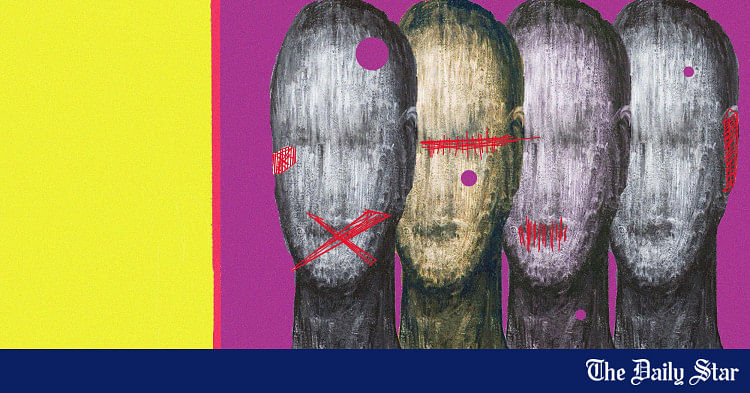In the heart of Bangladesh, a silent crisis is unfolding unnoticed: men’s mental health problems. A topic often overlooked due to societal norms and stigma, men’s mental health remains an unspoken topic, but its ramifications resonate in households and communities across the country. Let’s shed light on this urgent issue, addressing systemic gaps, societal attitudes and the urgent need for a paradigm shift to address this crisis.
According to research article published by several researchers based in Bangladesh and the United Kingdom in 2021, only 0.44 percent of the total health budget is allocated to mental health, with less than 0.11 percent of the population having free access to medicines essential psychotropic drugs. The mental health infrastructure is severely under-resourced. An article published by Cambridge University Press article by several Bangladeshi researchers and doctors twenty years ago, showed that Bangladesh had only 73 psychiatrists for a population of 123 million. Although the population has increased since then, the psychiatrist-to-patient ratio remains woefully low.
Bangladesh’s nascent and underfunded mental health systems pose a significant barrier for men seeking help for depression or other mental health disorders. Ingrained societal norms make the situation even worse. Men, bound by traditional gender roles, often find themselves trapped in a vicious cycle of silence and suffering. The idea of asking for help is seen as an affront to masculinity, which deters many people from seeking the support they desperately need.
From a young age, boys learn not to show their emotions but to suppress them. As a result, men feel less comfortable talking about or sharing their feelings, which can cause conflict in their relationships and lead to serious mental health problems. Another study indicated that factors such as inability to satisfy financial and intimate needs in marital relationships contribute to men’s suicidal tendencies. Additionally, decreased self-esteem and perceived lack of respect from others were associated with these tendencies.
A recent study, conducted at Bangabandhu Sheikh Mujib Medical University (BSMMU), highlighted that almost half (48.4 percent) of patients hospitalized at the facility were experiencing mental illness, and among this cohort, 54.8 percent were men and 45.2 percent were women. These people were admitted to different departments, but, surprisingly, only 3.6% of them were referred to the psychiatric department.
Meanwhile, male depression often goes undiagnosed due to a lack of recognition, as it accompanies headaches, digestion problems, and irritability related to physical health problems, symptoms that may also be due to depression. Additionally, downplaying symptoms, not talking about them openly, and suppressing the illness can mask depression. Alcohol or drugs are often used to minimize depression, which also affects physical and mental health.
On a more positive note, Bangladesh has undertaken to reform its mental health legislation. The new Mental Health Act of 2018 replaces century-old legislation aimed at protecting the property rights of people with mental illness and providing for mental health services. While this is a commendable step, there is still a long way to go. The legislation must be complemented by substantial investment in mental health infrastructure, professional training and nationwide awareness campaigns to destigmatize mental health issues, particularly among men.
Community initiatives can play a central role in bridging the gap. It is crucial to create safe spaces where men can openly discuss their mental health issues, share their experiences and seek professional help. Online platforms and support groups can also offer an opportunity for anonymous support, which might appeal to those who are hesitant to seek help in person. Integrating emotional literacy into the school curriculum from an early age, and particularly at university level, is essential to supporting mental wellbeing. This initiative can help break down stereotypes that discourage emotional expression in men, which often leads to mental health problems.
Universities play a key role in shaping this aspect of young adult development by offering courses on emotional management and access to mental health resources. This approach not only helps combat stress and anxiety among students, but also promotes overall emotional resilience and better interpersonal relationships.
The conversation about men’s mental health needs to move from hushed whispers to a national dialogue. It is imperative to involve diverse stakeholders, from government agencies to community leaders. Bangladesh cannot afford to remain silent in the face of a crisis that affects a significant portion of its population. Creating environments and systems that support the mental well-being of all people, regardless of gender, is essential to foster social cohesion and collective prosperity.
Mostak Ahamed Imran is a lecturer at Brac University and a children’s play therapist at the Institute of Educational Development in Brac.
Quazi Tafsirul Islam is a senior lecturer in the School of Business and Economics at North South University.
The opinions expressed in this article are those of the author.
Follow The Daily Star’s opinion on Facebook for the latest reviews, comments and analysis from experts and professionals. To contribute your article or letter to the Daily Star Opinion, visit our submission guidelines.
